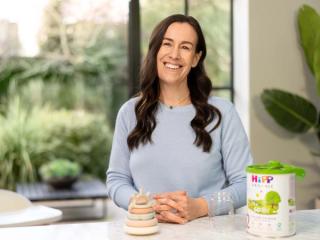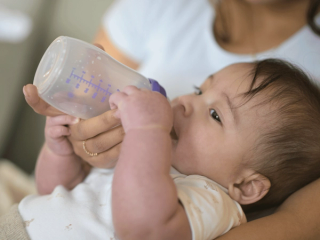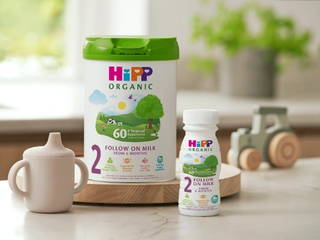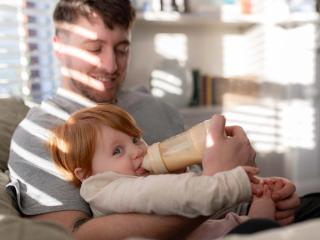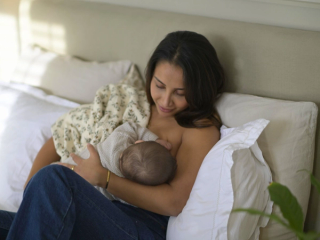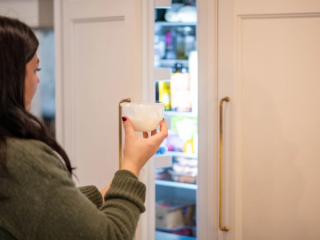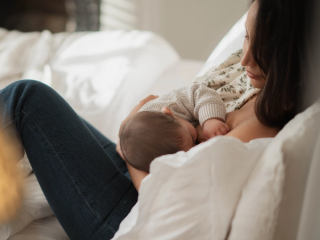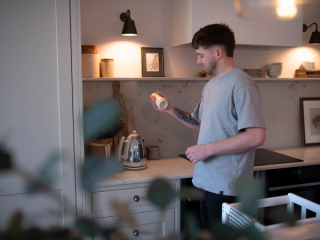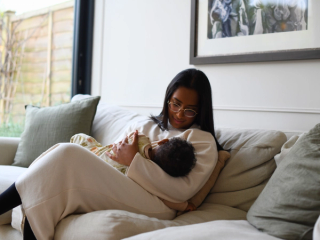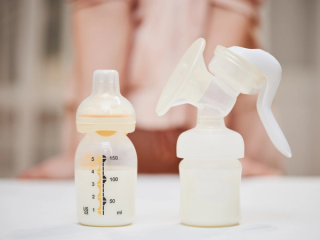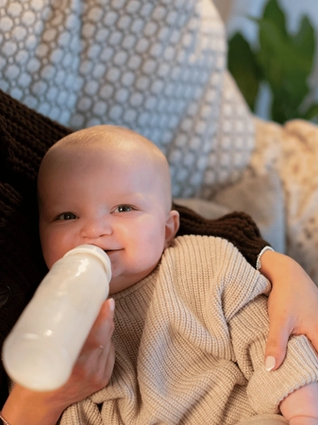
- Home
- Advice Hub
- Baby
- Baby Feeding
- How To Bottle - Feed Your Baby
How to bottle-feed your baby
Learn how to bottle-feed your baby safely with guidance on milk amounts, recognising hunger cues, preparing bottles, feeding positions & essential tips for peace of mind.
Step-by-step guide to bottle feeding
Choosing the right bottle and teat
Correct feeding position for your baby
Recognising hunger and fullness cues
How to clean and sterilise bottles
How much milk does my baby need?
How often does my baby need to feed?
How do I know my baby is getting enough milk?
How to bottle feed a baby FAQs
Step-by-step guide to bottle feeding
Feed on demand
The first thing to remember about bottle feeding your baby is that babies aren’t being greedy – they need what they need and it’s perfectly ok for you to respond when they’re hungry. In fact, it’s advised! Look for the early cues of hunger, such as finger sucking or moving their head and mouth as if they’re searching for food. Try not to wait until they’re crying because they may become too distressed to feed.
Get comfy and snuggle in close
Make sure you have everything you need close by and you’re sitting comfortably. Hold your baby in a semi-upright position with their head on your arm so you can look into their eyes. Eye contact helps reassure your baby and build your bond.
Offer, don’t push
Hold the bottle in a horizontal, slightly tipped position and begin by gently rubbing the teat against your baby’s top lip. This should encourage them to open their mouth. Once they’re opening up, gently insert the teat into their mouth and maintain the position of the bottle so that the milk doesn’t flow too quickly.
Follow their lead
Your baby may not want to down a whole bottle of milk in one go. They might like to take a break, or they might need burping mid-feed to remain comfortable. Follow their cues and don’t insist on finishing a feed if they don’t want to. Babies have a great sense of when they’ve had enough and will let you know by, for example, turning their head or – as they get older – pushing the bottle away. When they’re done, gently remove the teat, or tilt the bottle downwards to stop the flow.
Pat and rub
At the end of every feed, hold your baby upright either with their head to your shoulder or by supporting them on your lap. Give their back a gently pat and/or rub to help them bring up wind – you might want to keep a burp cloth or muslin handy in case this also brings up milk!
Choosing the right bottle and teat
Bottles and teats come in various shapes and sizes. The choice of bottle is often down to comfort and size, whereas the choice of teat also has to factor in flow speed. Little babies often can’t cope with fast-flowing milk, so a teat that slows the flow down helps them manage sucking, swallowing and breathing without becoming overwhelmed. The packaging will indicate the suitability of the bottle and teat for different ages and needs, so it’s not difficult to find what you need – just know that you’re not shopping for a one-size-fits-all solution.
Correct feeding position for your baby
If the ‘normal’ feeding position described above – with the baby’s head resting in the crook of your elbow – doesn’t work for you, don’t panic. While this position gives you control over the bottle and allows the baby to feel snug and secure, there are ways to make it more comfortable and still keep your little one in a suitable position. The important things to remember are:
- Maintain eye contact and stay close to promote bonding
- Keep the baby’s head and shoulders slightly elevated, ensuring the head is higher than their stomach
- Get comfortable and in a stable position so the baby feels snug and secure
Some people find both breast and bottle feeding hard on their upper back and neck, as you spend a long time in a fixed position. Feeding pillows can help reduce the strain on your muscles by raising your baby up a little, while still promoting that cosy feeling. If you’ve had a C-section, you might also appreciate taking baby’s weight off your abdomen. Sitting in an armchair, or alongside the arm of the sofa, also gives you a way to prop your arm up to keep baby elevated without tiring your shoulder. To learn more about different breastfeeding positions to improve comfort read our Midwife’s article here.
Recognising hunger and fullness cues
Just as with breastfeeding, it is important for parents who are bottle feeding to learn to recognise when their baby is hungry. Crying is a late sign for hunger and there are plenty of signs to look out for before your baby gets to that point, such as:
- Sucking hands, fingers, or whatever comes near their mouth
- Rooting around – nudging with mouth or nose, for example – as though they’re looking for their source of milk
- Being restless and unsettled, as though they can’t get comfortable
- Turning their head and/or opening and closing their mouth like a little fish
Responding to your baby’s hunger cues – rather than trying to feed to a schedule –is recommended by many health care professionals as being best for babies.
How to clean and sterilise bottles
It’s important to follow all recommended steps for preparing bottles, to ensure the safety and wellbeing of your baby. Start by washing your hands thoroughly with soap and water. Clean the bottle, teat, and other feeding equipment in hot, soapy water, ensuring all milk residue is removed, and rinse them well. Once cleaned, sterilise the equipment using your preferred method. After sterilising, ensure all equipment is assembled and used within 24 hours, keeping it covered until needed.
To prepare standard formula, boil fresh tap water in a kettle and let it cool for no longer than 30 minutes, so it remains at a temperature of at least 70°C. Pour the required amount of hot water into the sterilized bottle, following the instructions on the formula packaging for the correct ratio of water to powder. Use the scoop provided in the formula tin, levelling off the powder with a clean knife. Add the powder to the bottle, screw on the teat and lid, and shake well to ensure it dissolves completely.
Before feeding, cool the bottle down by placing it in cold water or holding it under a cold tap until it reaches a safe temperature. Test the temperature by dropping a little formula on the inside of your wrist; it should feel warm or cool, not hot. Once the bottle is prepared, feed your baby immediately. Discard any unused formula within two hours to avoid bacterial contamination. Store the unopened formula powder in a cool, dry place, and always use within the manufacturer's recommended time frame after opening.
If using a specialist formula under the advice of your healthcare professional, please follow the preparation instructions on the back of the packaging carefully, as they differ from standard infant formula instructions.
How much milk does my baby need?
Whether you’re bottle feeding formula milk or using expressed breast milk, how much milk your baby will need will vary depending on their age and weight. Newborns generally only need a small amount – little and often – but this will increase as they get older and bigger.
Most babies will fall into their own feeding pattern and routine, so try to follow their cues and feed responsively. Don’t ignore your baby’s hunger cues in favour of a strict feeding regime.
How often does my baby need to feed?
The below table offers some general guidance to quantities and frequency of feeds, but bear in mind this is just a guide and responsive feeding is best. Generally, babies over one week old typically need 150 – 200 ml per kg of body weight in a 24-hour period, up until they are 6 months old. For example, a 5 kg (11 lb) baby would need 750 ml – 1 litre of formula daily. From 6 months, milk feeds will decrease as they eat more solid food.
You may find there are times when your baby wants to bottle feed more or less often than usual. This might be because they are teething or feeling unwell or they may be experiencing a growth spurt.
How do I know my baby is getting enough milk?
If your baby is settling in between feeds and gaining weight, this is usually a good sign that they are feeding well. Another indicator is how many wet and dirty nappies they are producing.
In the first 48 hours, it is normal for your baby to have only two or three wet nappies per day. But once your baby is a few days old or older, they should be producing at least six wet nappies in a 24-hour period.
If you need more individual advice on how much or how often to feed your baby, please contact your healthcare professional.
How to bottle feed a baby FAQs
- Always make sure your bottle feeding equipment is clean and sterile by following the guidance on sterilising bottles and teats.
- Never leave your baby unattended with a bottle.
- Do not microwave formula milk, as this may lead to hot spots. Always test the temperature of the milk before giving it to your baby.
- Only make up the feed that you need and throw away leftover milk.
- Don’t force feed your baby – be led by their cues as to when they are hungry and when they have had enough.
Conclusion
Whether you are new to parenting, getting prepared ahead of the baby’s arrival, or introducing a bottle later in your baby’s life, we hope these tips have been helpful. The most important thing to remember is that bottle feeding is still a beautiful opportunity for bonding with your baby – and one you can share with your partner and other members of your family. Follow this guidance to ensure a happy, healthy feeding journey – and always remember to speak to your healthcare professional if you have any concerns.
Important Notice
We recognise that breastfeeding is best, providing many benefits to both mothers and infants. We also recognise that every parenting journey is unique, and we are here to support you through this journey, however you choose to feed your baby.
If you choose to breastfeed it is important that you eat a healthy well-balanced diet in preparation for and during breastfeeding. Before deciding to combination or formula feed your baby, note that reducing or stopping breastfeeding can be difficult to reverse. Babies feed on demand, so replacing breastfeeding with infant formula milk may reduce your supply. Formula feeding has both social and financial implications. Talk to your midwife or health visitor for guidance and support.
If you choose to use formula milk, make sure you choose the right milk for your baby’s age and prepare and store it according to the instructions on the packaging. Not doing so may make your baby ill. Infant formula is a nutritionally complete breastmilk substitute that can be used from birth. From 6 months you can choose to use follow on milk as part of a mixed diet and from 12 months you have the option to move onto growing up milk alongside a balanced diet.
